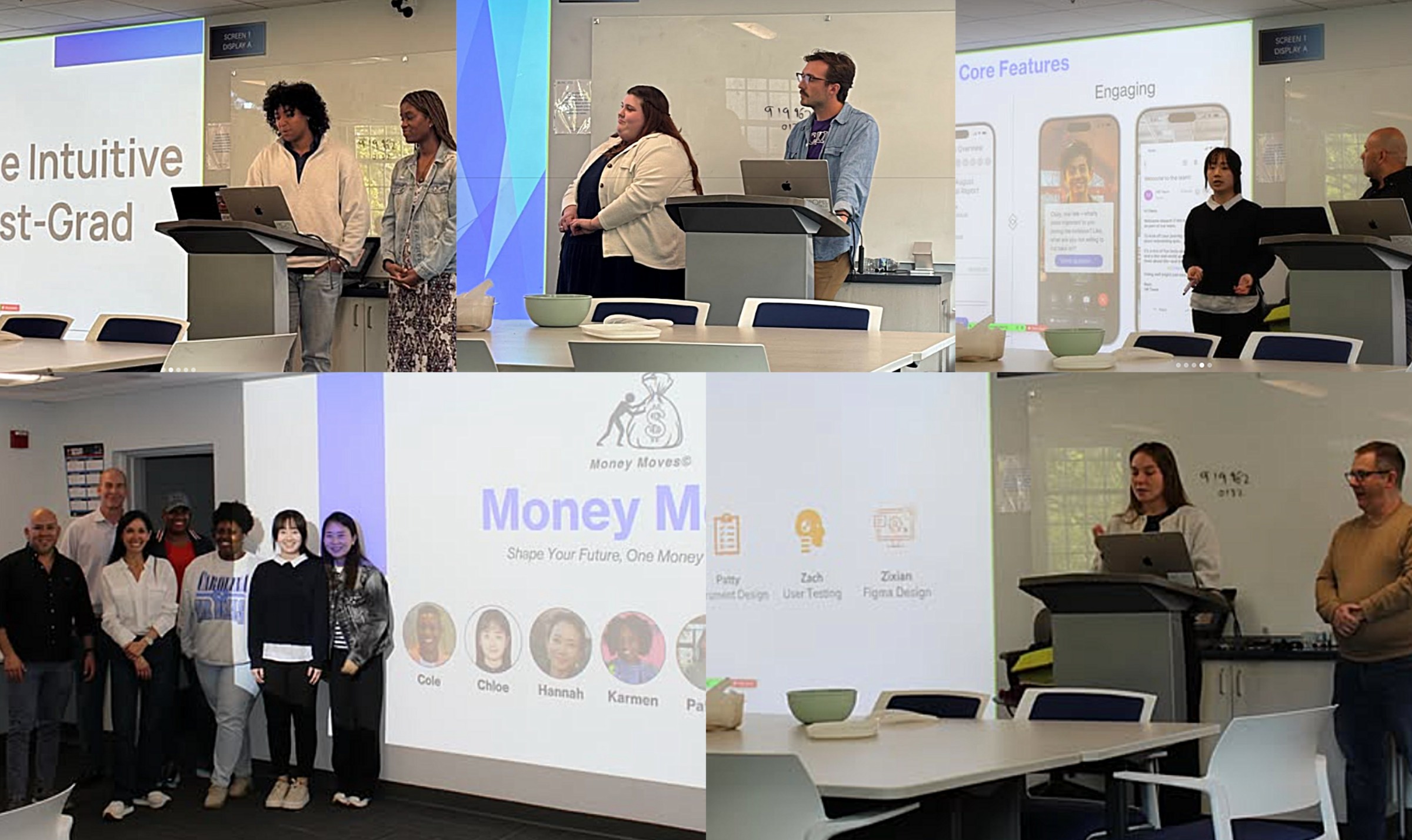In spring 2025, students in the UNC School of Education’s Master of Arts in Educational Innovation, Technology, and Entrepreneurship program applied their coursework by creating a financial literacy game for college students.
The project challenged MEITE students to design a new game for Intuit for Education, providing them the opportunity to develop a real-world product for a leading company and gain experience innovating across sectors and learning environments.
As documented in a case study publication, “Celebrating Academia – Industry Collaborations in EdTech,” MEITE students worked in teams to develop prototypes that would help college seniors prepare for the financial decisions they could face in the transition from college to the workforce.
Modeled on a financial literacy game Intuit originally developed for professional athletes, students adapted the concept for soon-to-be and recent college graduates. Using design thinking, they identified the financial literacy needs of new graduates and built a game-based platform to help users think through how they will spend, save, and strategize their finances. From living expenses and recreation to family visits and vacations, MEITE students aimed to create a comprehensive, engaging experience using Figma to develop both content and interactive designs.
The project resulted from collaborative discussions between Todd Cherner, Ph.D., MEITE program director; Lynn Letukas, Ph.D., Intuit’s Head of Strategic Programs and Partnerships; and Jared Davidove, Intuit for Education’s Head of Product. Letukas and Cherner originally connected through a local educational technology networking group. As they explored their shared interests, Letukas proposed a project opportunity tailored to MEITE students’ strengths in edtech, product development, and design thinking.
“Partnerships are the lifeblood of MEITE,” Cherner said. “They enable students to have an industry-based experience where they work on an authentic project.”
Cherner and Jamie Elsner, a MEITE graduate teaching assistant and a doctoral student in the School’s Learning Sciences and Psychological Studies Ph.D. concentration, guided students through the design thinking process. Divided into five teams, students began by working to understand the challenge from multiple perspectives. They studied how individuals navigate early-career financial decisions, created personas, and developed empathy maps to define the problem more clearly.
The user testing phase — led by recent MEITE alumnus Zachary Hall (’25 M.A.), a change management and learning leader with over 15 years of experience guiding Fortune 500 and Big Four consulting firms through digital transformations —focused on gathering feedback from a broad, representative sample. Hall included undergraduate and graduate students with varied backgrounds and also consulted members of the Design and Innovation for the Public Good team at Innovate Carolina, who regularly deliver professional design thinking workshops.
As part of the project, Hall also led an exercise in which teams defined target personas and brainstormed real-life financial decision-making scenarios for recent graduates.
“Applying the design thinking methodology to a real-world problem for a company like Intuit was invaluable,” Hall said. “It has provided me with experiences and lessons learned that I can discuss in employer interviews and apply in future roles. I appreciated gaining hands-on experience with prototyping tools and learning strategies for using AI to organize and synthesize user feedback.”
For recent MEITE alumna Yingqi Wu (’25 M.A.), who served as the project’s layout designer lead, the work built on her background in bilingual education, instructional design, and edtech. Wu began her career in Shenzhen, China, teaching third-grade mathematics in both Mandarin and English at a bilingual school that blended American and Chinese curricula. In her third year, she became a floater teacher lead, onboarding new teachers and supporting professional development.
Wu, who also holds a master’s degree in Content and Language Integrated Learning from the University of Hong Kong, led the visualization of the game structure and flow. She collaborated with teammates to ensure their design choices connected emotionally and cognitively with users from varied backgrounds. The team crafted an interactive storyline in which players take on the role of a relatable recent graduate managing real-life financial decisions such as rent, subscriptions, budgeting, and job hunting.
“This process taught me the power of combining empathy-driven persona development with interactive narrative design,” Wu said. “It wasn’t just about what we wanted to teach, but how we could embed learning into a story that users could see themselves in.”
Read more about the case study here.
Citation:
International Centre for EdTech Impact (2025). Case studies 20205. Celebrating Academia-Industry collaborations in EdTech. Stavanger, Norway.
